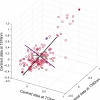Articles
High resolution infrared studies at the Rutherford Appleton Laboratory Molecular Spectroscopy Facility: Part 1
The author looks at the origins and research at the Molecular Spectroscopy Facility (MSF) at the Rutherford Appleton Laboratory (RAL).
Probing chiral recognition in liquid chromatography by absolute configuration modulation ATR-IR spectroscopy
The authors report on an analytical technique based on the combination of attenuated total reflection infrared (ATR-IR) spectroscopy and modulation excitation (ME), which enables the investigation of the interactions leading to separation at the selectand—selector interface.
Differential optical absorption spectroscopy as a tool to measure pollution from space
Andreas Richter
Institute of Environmental Physics, University of Bremen, Bremen, Germany. E-mail: [email protected]
Quantum cascade lasers bring sensitivity and speed to infrared gas sensing
Geoffrey Duxbury and Nigel Langford
Scottish Universities Physics Alliance, Department of Physics, John Anderson Building, University of Strathclyde, 107 Rottenrow East, Glasgow G4 0NG, UK. E-mail: [email protected], [email protected]
Near infrared spectroscopy: the workhorse in the PAT toolbox
Erik Skibsted
Novo Nordisk, CMC Supply, Analytical Development, Denmark. E-mail: [email protected]
Food authentication: has near infrared spectroscopy a role?
Gerard Downey,a* J. Daniel Kellya and Cristina Petisco Rodriguezb
aTeagasc, Ashtown Food Research Centre, Ashtown, Dublin 15, Ireland. E-mail: [email protected]
b Instituto de Recursos Naturales y Agrobiología, CSIC, Apdo 257, 37071 Salamanca, Spain
Simultaneous near infrared spectroscopy and dynamic rheological analysis for process monitoring of reactive polymers
S. Benali,a D. Bertrand,b J. Dupuyc and G. Lachenald
aUniversité de Mons Hainaut, Matériaux Polymères et Composites, Place du Parc, 20 ,7000 Mons, Belgium
bENITIAA-INRA, Unité de Sensométrie et Chimiométrie, BP 82225, 44322 Nantes Cedex 03, France. E-mail: [email protected]
Back to basics: applications of principal component analysis
A.M.C. Davies
Norwich Near Infrared Consultancy, 75 Intwood Road, Cringleford, Norwich NR4 6AA, UK
NIR spectroscopy explores the mysteries of acupuncture
Gerhard Litscher
Biomedical Engineering and Research in Anesthesia and Intensive Care Medicine, Medical University of Graz, Auenbruggerplatz 36, A-8036 Graz, Austria. E-mail: [email protected]; http://litscher.at; http://litscher.info
Back to basics: the principles of principal component analysis
PCA is a mathematical method of reorganising information in a data set of samples. It can be used when the set contains information from only a few variables but it becomes more useful when there are large numbers of variables, as in spectroscopic data.
High-resolution infrared spectroscopy for in situ industrial process monitoring
Philip Martina,c and Robert Holdsworthb
aDepartment of Chemical Engineering, UMIST, PO Box 88, Manchester M60 1QD, UK. E-mail: [email protected]
bTDL Sensors Ltd, UVL, 70–72 Sackville Street, Manchester, UK. E-mail: [email protected]
cFrom 1 October 2004, School of Chemical Engineering and Analytical Science, University of Manchester
Independence rules (or Rules for independence)
A.M.C. Davies
Norwich Near Infrared Consultancy, 75 Intwood Road, Cringleford, Norwich NR4 6AA, UK
MEMS technology moves process spectroscopy into a new dimension
Richard A. Crocombe
Axsun Technologies, Inc., 1 Fortune Drive, Billerica, MA 01821, USA
What is PAT?
A.M.C. Davies
Norwich Near Infrared Consultancy, 75 Intwood Road, Cringleford, Norwich NR4 6AA, UK
Polymer characterisation by spectroscopic imaging: infrared and electron microscopy: a good match
Peter Wilhelm,a Boril Chernev,a Peter Pölt,a Gerald Kothleitner,a Klaus-Jochen Eichhorn,b Gisela Pompe,b Nikola Johnerc and Alexander Piryc
aResearch Institute for Electron Microscopy, Graz University of Technology; Steyrergasse 17, A-8010 Graz, Austria. E-mail: [email protected]
bInstitute of Polymer Research Dresden; Hohe Straße 6, D-01069 Dresden, Germany
A bright source for infrared microspectroscopy: synchrotron radiation
This article looks at the advantages of synchrotron radiation for infrared microspectroscopy, selected applications and its future potential.
Infrared and Raman spectroscopic imaging in biosciences
David Chenery and Hannah Bowring
Smith & Nephew Group Research Centre, York Science Park, Heslington, York YO10 5DF, UK
Investigating the curing of amino resins with TGA-MS and TGA-FT-IR
Dipl. Chem. FH Ch. Schanzer and Prof. Dr H.G. Bührer
Department of Chemistry, Zurich University of Applied Sciences Winterthur (ZHW), CH-8401 Winterthur, Switzerland
Doing it faster and smarter (Lesson 6 of Matrix Algebra)
A.M.C.Davies,a and Tom Fearn,b
aNorwich Near Infrared Consultancy, 75 Intwood Road, Cringleford, Norwich NR4 6AA,UK
bDepartment of Statistical Science, University College London, Gower Street, London
Light and sound—photoacoustic spectroscopy
An introduction to photoacoustic spectroscopy.

